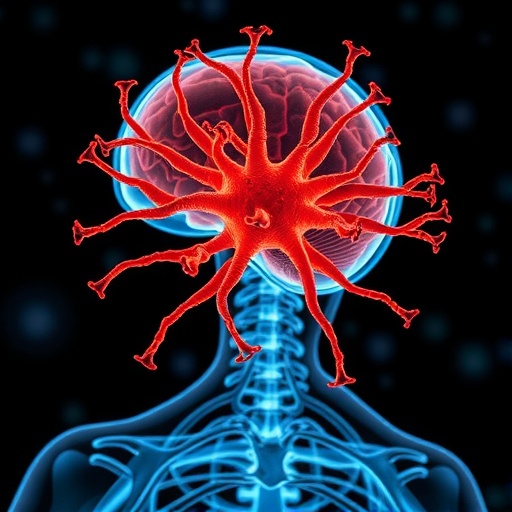In a groundbreaking study recently published in Nature, researchers have unveiled compelling evidence linking immune system activity to neurodegenerative diseases through specific T cell responses targeting the C9orf72 protein. While prior investigations largely focused on amyotrophic lateral sclerosis (ALS), this new research expands the horizon by demonstrating that T cell reactivity to C9orf72 peptides is not only a hallmark of ALS but also evident in other devastating neurodegenerative disorders such as Parkinson’s disease (PD) and Alzheimer’s disease (AD).
The C9orf72 gene has long been under scrutiny for its involvement in familial ALS, with pathological expansions of a hexanucleotide repeat in this gene serving as a prominent genetic cause. Intriguingly, the recent research delves into the autoimmune responsiveness against the C9orf72 protein itself, rather than just its genetic aberrations, suggesting a broader role of adaptive immunity in neurodegeneration. This study breaks new ground by analyzing whether T cell immune responses, specifically directed against C9orf72 peptides, are exclusive to ALS or characteristic of neurodegeneration in a wider sense.
By comparing immune responses in individuals diagnosed with Parkinson’s disease or Alzheimer’s disease to those in ALS patients and healthy controls, the research team identified that both PD and AD patients exhibited significantly elevated T cell reactivity towards C9orf72 peptides. This unexpected finding challenges the previously held notion that autoimmune responses against C9orf72 are limited to ALS and hints at a ubiquitous immune component traversing multiple neurodegenerative phenotypes.
The T cell response measured predominantly involved the secretion of interferon-gamma (IFNγ), a cytokine closely associated with proinflammatory immune activity. Remarkably, this IFNγ-driven response pattern was similar between PD and AD patients and healthy controls, suggesting a conserved mechanism of immune activation in these groups. Contrarily, the ALS patients displayed a differing cytokine profile, with variations in IL-5 — a cytokine linked to allergic and regulatory immune processes — highlighting a qualitative difference in the autoimmune response.
These nuanced immunological disparities underscore the complexity of neurodegenerative diseases’ pathogenesis, intertwining genetic predispositions, protein misfolding, and immune-mediated inflammation. The dichotomy in cytokine patterns between ALS and other neurodegenerative disorders may reflect unique disease mechanisms or suggest divergent stages or severities of immune involvement.
Crucially, this study utilized robust immunological assays to stimulate patient-derived T cells with synthetic peptides corresponding to the C9orf72 protein, allowing precise quantification of antigen-specific immune responses. This methodological approach provides concrete evidence that the immune system in neurodegenerative patients not only recognizes C9orf72 but mounts functional responses that could potentially exacerbate neuronal damage.
Another significant revelation is the potential for immune cross-reactivity or epitope spreading in patients suffering from different neurodegenerative diseases. If common self-antigens, like C9orf72, serve as targets for pathogenic T cells across these disorders, it raises the possibility of shared therapeutic avenues targeting immune modulation, perhaps slowing disease progression or alleviating symptoms.
The implications of these findings extend into the realm of biomarker development. The distinct patterns of IFNγ and IL-5 secretion in ALS versus PD or AD patients might serve as immune signatures, facilitating diagnosis or prognostication. Monitoring T cell responses against C9orf72 peptides could thus emerge as a novel immunodiagnostic tool specific to neurodegenerative disease subtypes.
Moreover, this research highlights the indispensable role of adaptive immunity in diseases traditionally categorized as neurodegenerative and neuroinflammatory comorbidities. Previously, T cells were not heavily implicated as central players in the pathology of Alzheimer’s or Parkinson’s diseases. This study contradicts that assumption, proposing that immune dysregulation may be more pervasive and perhaps a contributor rather than just a bystander.
Therapeutically, targeting these autoimmune responses offers a tantalizing prospect. For ALS patients, strategies aimed at modulating IFNγ pathways or balancing the IL-5-mediated responses might yield clinical benefits. In PD and AD, understanding the mechanisms driving elevated C9orf72-directed T cell activity could enable interventions that curb neuroinflammation without compromising overall immune competence.
It also invites questions regarding the triggers for such autoimmune phenomena. Does neuronal death unmask antigenic epitopes, initiating a misguided immune attack? Or do systemic immune alterations provoke these reactions, thereby exacerbating neurodegeneration? Future research must endeavor to unravel this chicken-and-egg scenario, determining causality and sequence in autoimmune involvement.
Furthermore, these insights stress the importance of comprehensive patient profiling, integrating genetic, neuropathological, and immunological data to form a holistic picture of neurodegenerative disease mechanisms. Precision medicine approaches tailored to immune profiles might enhance therapeutic responses and outcomes.
This landmark study by Michaelis, Lindestam Arlehamn, Johansson, and colleagues thus paves the way for a deeper understanding of how autoimmune responses to C9orf72 proteins intersect with neurodegenerative disorders beyond ALS. It challenges the scientific community to reconsider fundamental paradigms and to leverage immunology in the quest for more effective treatments for these debilitating conditions.
As research continues to elucidate the interplay between genetics, protein pathology, and immunity, the promise of novel diagnostic biomarkers and immune-targeted therapies brings renewed hope to millions affected worldwide by ALS, Parkinson’s, and Alzheimer’s diseases. The expanding role of T cells in neurodegeneration may ultimately redefine therapeutic strategies and transform patient care.
Subject of Research: Immune system responses to C9orf72 protein in neurodegenerative diseases
Article Title: Autoimmune response to C9orf72 protein in amyotrophic lateral sclerosis
Article References:
Michaelis, T., Lindestam Arlehamn, C.S., Johansson, E. et al. Autoimmune response to C9orf72 protein in amyotrophic lateral sclerosis. Nature (2025). https://doi.org/10.1038/s41586-025-09588-6
Image Credits: AI Generated
Tags: adaptive immunity in neurodegenerationAlzheimer’s disease and immune activityautoimmune attack on C9orf72autoimmune response in neurodegenerative diseasesC9orf72 gene and T cell responsesC9orf72 protein and ALSfamilial ALS genetic causesneurodegenerative disorders and immune systemParkinson’s disease and C9orf72relationship between ALS and autoimmune diseasesT cell reactivity and neurodegenerationT cell responses in neurodegenerative disorders





